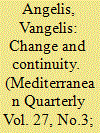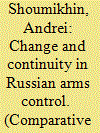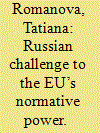| Srl | Item |
| 1 |
ID:
148647


|
|
|
|
|
| Summary/Abstract |
A comparison between the two dictatorships of Greece in the twentieth century (the 4th of August regime of 1936 – 41 and the Colonels’ dictatorship of 1967 – 74) cannot be fruitful if it is static. One cannot understand the nature of these two regimes without studying the years that separated them. This period oscillated between Venizelism and anti-Venizelism and was characterized by the ideological struggle between capitalism and communism of the Cold War prior to the restoration of democracy in Greece in 1974. A look at these years reveals interesting insights into the legacies and the continuities of Greek society in the twentieth century.
|
|
|
|
|
|
|
|
|
|
|
|
|
|
|
|
| 2 |
ID:
087988


|
|
|
|
|
| Publication |
2009.
|
| Summary/Abstract |
Russian arms control is not a brand new creation disembodied from the past but is heavily influenced by the history of arms control in the Soviet era. Tracing the evolution of Russian thinking from the days of Stalin, through the arms control boom of the 1970s, to the reforms of Gorbachev and the Soviet disintegration, this article flushes out the Soviet perspective on issues such as strategic stability and the use of treaties to slow an adversary's technological advancement. Further, this article relates the influence of Soviet opinion to current-day thinking in the Russian Federation (RF). As the U.S. and the RF prepare to tackle tough issues, like the expiration of the Strategic Arms Reduction Treaty in 2009, these viewpoints become particularly salient.
|
|
|
|
|
|
|
|
|
|
|
|
|
|
|
|
| 3 |
ID:
145302


|
|
|
|
|
| Summary/Abstract |
The article examines how Russian criticism of the normative power Europe (NPE) has evolved. Initially Russia insisted that NPE arguments covered realpolitik. However, two new approaches have recently emerged in Russian reporting on human rights in the EU. One is the demonstration that the EU does not qualify as a normative power. Another is the development of an alternative interpretation of human rights. Russia has, therefore, mastered all NPE critiques. This has occurred as the result of a change in how Russia views international relations. Moscow’s ultimate goal has, however, remained unchanged; it is to reaffirm its equality with key global players.
|
|
|
|
|
|
|
|
|
|
|
|
|
|
|
|